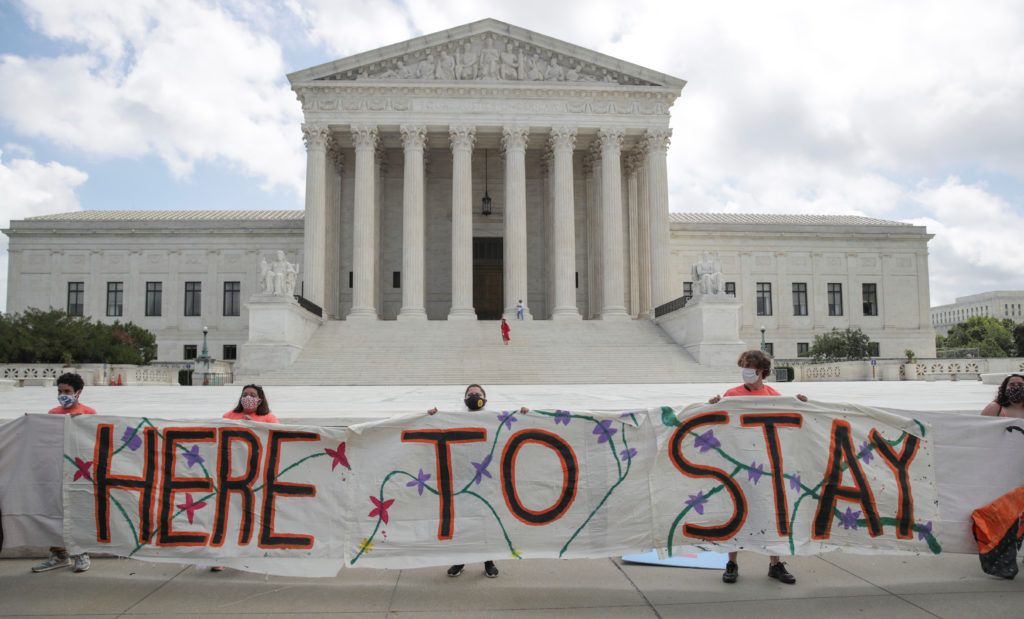US Citizenship and Immigration Services claims the Supreme Court’s DACA decision “has no basis in law”

A few minutes every morning is all you need.
Stay up to date on the world's Headlines and Human Stories. It's fun, it's factual, it's fluff-free.
Immigration advocates have celebrated the Supreme Court’s rejection of the Trump administration’s bid to end the Deferred Action for Childhood Arrivals (DACA) program.
The court’s decision, however, has not been unanimously lauded. A statement by US Citizenship and Immigration Services (USCIS) the day after the court’s ruling called DACA “illegal” and criticized the court’s decision as having “no basis in law.”
Robert G. Berke, an immigration lawyer in California, called the statement “inflammatory” and expressed astonishment that a government agency would publicly undermine the highest court in the land. Historically, it is uncommon for a nonpartisan agency like USCIS to take such a publicly partisan stance and it’s unheard of for one to question the legitimacy of the Supreme Court.
USCIS criticizes the Supreme Court
On June 19, USCIS Deputy Director for Policy Joseph Edlow released a statement in response to the Supreme Court’s decision to uphold DACA. It opened by stating, “Today’s court opinion has no basis in law and merely delays the President’s lawful ability to end the illegal Deferred Action for Childhood Arrivals amnesty program.”
It continued, “The constitutionality of this de facto amnesty program created by the Obama administration has been widely questioned since its inception. The fact remains that under DACA, hundreds of thousands of illegal aliens continue to remain in our country in violation of the laws passed by Congress and to take jobs Americans need now more than ever.”
Berke says this statement was remarkable for multiple reasons.
“USCIS is a benefits agency, not an enforcement agency. It is supposed to be apolitical and bound by the rule of law. For an agency to show this level of disrespect for the Court that governs it is outrageous.”
He is especially concerned for the precedent.
“Respect for the judiciary is a cornerstone of civil society. When a populace does not trust the Courts to administer justice, the society is on its last legs. For a government agency to denigrate the Court like this is the beginning of the end.”
He also refuted the idea that the Supreme Court’s decision was without basis in law. In fact, upholding DACA was not about determining the program’s legality. The court determined that the Trump administration’s attempt to repeal the law “wasn’t done in a procedurally correct way.”
“To cause the people to question the legitimacy of the legal process at the Supreme Court,” Berke warned, “is too wrong to be ignored.”
What is USCIS?
US Citizenship and Immigration Services was created on March 1, 2003, effectively replacing the Immigration and Naturalization Service (INS). Its creation was part of the Homeland Security Act of 2002, which passed after the 9/11 terrorist attacks.
The aim of creating USCIS was “to enhance the security and efficiency of national immigration services.” It did this by splitting up the responsibilities of the INS into three separate agencies: USCIS, Immigration and Customs Enforcement (ICE) and Customs and Border Protection (CBP).
While ICE and CBP enforce immigration restrictions, USCIS was intended to focus “exclusively on the administration of benefit applications.”
“The idea,” Berke explained, “was that by separating benefits from enforcement, people wouldn’t be discouraged from applying for things they were eligible for. Thus people who could normalize their status were still encouraged to do so, while people who couldn’t had to worry about heightened enforcement actions.”
The evolution of USCIS
Allowing benefits distribution to be run independently of enforcement meant that immigrants with legal status didn’t run the risk of being caught up by vast enforcement actions that often can’t easily distinguish between immigrants with a legal status and immigrants without.
In 2018, though, USCIS began sending out summons to the Immigration Court, known as a Notice to Appear (NTA). They had become part of the removal (or deportation) proceedings.
This was a reversal of the original purpose of the agency, which was to ensure immigrants with legal status (including DACA recipients) felt secure in their ability to get their benefits without the fear of being wrongfully prosecuted.
In fact, Berke argues, while it may be assumed that removal proceedings only target undocumented immigrants, in reality, immigrants with legal status are caught up in enforcement frequently. They then get stuck in an immigration court system that is already overwhelmed with cases where they then struggle to prove their legal status.
Meanwhile, actual criminals and terrorists – the stated target of most immigrant enforcement actions – don’t respond to NTAs, so they aren’t apprehended.
Berke, who represents DACA recipients (or Dreamers), also pointed out that the USCIS’ mission statement changed in February 2018. It was formerly:
“USCIS secures America’s promise as a nation of immigrants by providing accurate and useful information to our customers, granting immigration and citizenship benefits, promoting an awareness and understanding of citizenship, and ensuring the integrity of our immigration system.”
Now, it is:
“US Citizenship and Immigration Services administers the nation’s lawful immigration system, safeguarding its integrity and promise by efficiently and fairly adjudicating requests for immigration benefits while protecting Americans, securing the homeland, and honoring our values.”
“Recognition of the US as a nation of immigrants,” Berke notes, “was omitted.”
Have a tip or story? Get in touch with our reporters at tips@themilsource.com




Comments ()